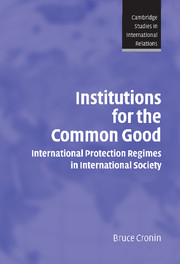Book contents
- Frontmatter
- Contents
- Acknowledgments
- 1 Introduction: international relations theory and the common good
- 2 International protection regimes in an international order
- 3 The national state and the protection of ethnic minorities
- 4 The liberal state and the protection of European citizens
- 5 The multicultural state and the protection of ethnic communities
- 6 The nation-state and the protection of refugees
- 7 Conclusion
- Bibliography
- Index
- CAMBRIDGE STUDIES IN INTERNATIONAL RELATIONS
7 - Conclusion
Published online by Cambridge University Press: 22 September 2009
- Frontmatter
- Contents
- Acknowledgments
- 1 Introduction: international relations theory and the common good
- 2 International protection regimes in an international order
- 3 The national state and the protection of ethnic minorities
- 4 The liberal state and the protection of European citizens
- 5 The multicultural state and the protection of ethnic communities
- 6 The nation-state and the protection of refugees
- 7 Conclusion
- Bibliography
- Index
- CAMBRIDGE STUDIES IN INTERNATIONAL RELATIONS
Summary
The politics of international relations is very complex. While it is the primary responsibility of foreign policy officials to promote the security and prosperity of their own populations and domestic institutions, most political leaders are also aware that under conditions of structural interdependence they must occasionally act to further the interests of the broader international society of which they are a part. This produces a constant tension between parochial interest and international responsibility. All other things being equal, political leaders will favor these interests even at the expense of their allies and partners. Yet all things are often not equal. States create international political orders to institutionalize one set of political values over competing ones, and to secure a particular distribution of resources and authority within a region or system. The principles, institutions, and practices that underlie this order shape the political environment through which they interact. States therefore have a strong interest in its future. When the cohesion of this international order is threatened, many political leaders find that they must act on behalf of the collectivity.
In this study, I examined one particular institutional practice aimed at furthering the interests and progress of international society. The preceding chapters considered how states attempted to maintain cohesive political orders by protecting those population groups whose vulnerability was most likely to threaten the stability of these orders. I argued that this practice of protecting foreign populations represents a definable form of institutional cooperation, which I called International Protection Regimes (IPRs).
- Type
- Chapter
- Information
- Institutions for the Common GoodInternational Protection Regimes in International Society, pp. 185 - 213Publisher: Cambridge University PressPrint publication year: 2003



